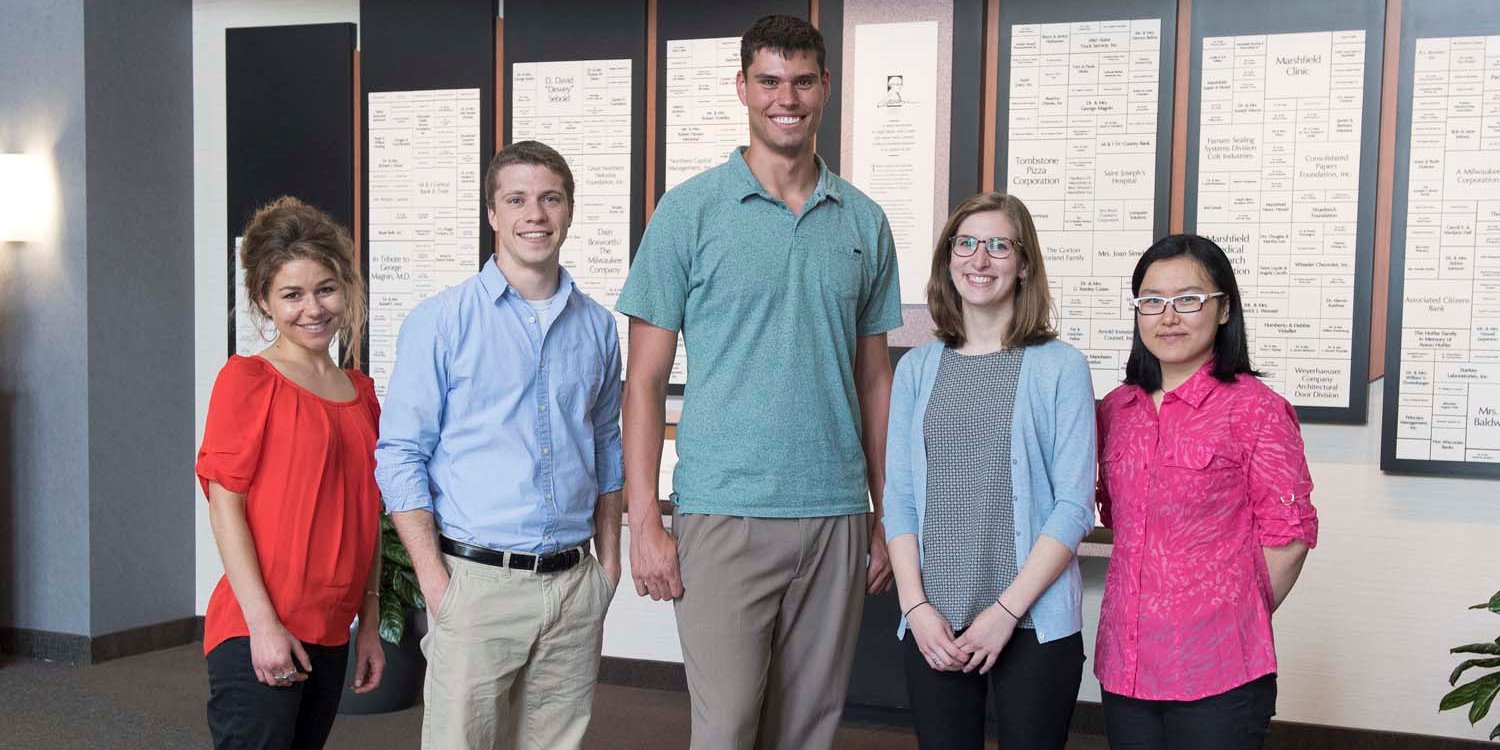Marshfield Clinic Research Foundation (MCRF) continues a 40-year tradition of concluding the Summer Research Internship Program (SRIP) with a Symposium, this year set for Thursday, August 11, from 10 a.m. to 12:30 p.m., Froehlke Auditorium, Marshfield Center.
Directed by Huong McLean, Ph.D., the summer internship provides a 12-week research experience tailored to each student’s skill level and is related to ongoing Marshfield Clinic research. The program enables students to put their education into practice as they work side by side with scientists who are experts in their fields.
SRIP is supported entirely through philanthropy. Thanks to the generosity of many community partners, Clinic employees, foundations, businesses and a major sponsorship by The Boldt Company, the program had financial resources to host six students this year.
Clinic staff and physicians are invited to attend as many of the presentations as schedules allow. The Symposium can also be viewed via MediaSite Live. A luncheon follows the presentations, which include:
10:10am
Origins of Stillbirth and Miscarriage in the Context of Twinning
Colin Korlesky
Mentored by Elizabeth McPherson, M.D., emeritus researcher, Center for Human Genetics, Colin Korlesky examined records from the Wisconsin Stillbirth Service Program database to explore the impact of multifetal gestation on the rate of second trimester miscarriage and stillbirth as related to identical vs. fraternal twinning. A Marshfield native, Korlesky will graduate from UW-Madison this fall with a bachelor’s degree in biomedical engineering. Korlesky’s project with Dr. McPherson continues previous work in multifetal gestation.
10:30am
Phenome-Wide Association Study Utilizing Imputation Identifies Common Genetic Variants Shared by Type 1 Diabetes and Multiple Diseases
Matthew Eidenschink
With guidance from Center for Human Genetics scientist Scott Hebbring, Ph.D., and postdoctoral fellow Jamie Fox, Ph.D., and using the complimentary phenome-wide association study (PheWAS) approach, Matthew Eidenschink used T1D-associated SNPs to find common genetic etiology between T1D and other conditions. A native of Rome, Eidenschink graduated from UW–La Crosse this spring with a bachelor’s degree in biomedical sciences and will begin studies this fall at the University of Minnesota Medical School.
10:50am
Development of a Big Data Toolset for Identifying Functional Genetic Variants
Yiqing Zhao
Mentored by scientist Max He, Ph.D., Center for Human Genetics, Yiqing Zhao developed a web-based genetic variants annotation big data platform, which achieves a faster speed for identifying these variants. Zhao received her master’s degree in bioengineering at UCLA after receiving a bachelor’s degree in chemistry at Fudan University. Zhao is a doctor of philosophy candidate in the medical informatics program at UW–Milwaukee.
11:20am
Developing a Pediatric Database to Facilitate Dental Caries Risk Assessment
Grayson Cole
Mentored by dental informatics research specialist Neel Shimpi, B.D.S., M.M., project scientist Ingrid Glurich, Ph.D., and Amit Acharya, B.D.S., M.S., Ph.D., Director, Institute for Oral & Systemic Health, Grayson Cole used retrospective data from Marshfield Clinic’s data warehouse to develop a database for pediatric patients and an algorithm to assess dental caries risk among this population. A native of Stratford, Cole is attending the University of Minnesota Dental School.
11:40am
Factors Associated with Recurrent Influenza Infection, 2004-2015
Emma Seagle
Mentored by Dr. McLean and epidemiologist Jennifer King, M.P.H., Emma Seagle conducted a case-control analysis using data from annual influenza vaccine effectiveness studies to describe characteristics of people with repeat medically attended influenza and identified factors associated with the same subtype repeat infections. Seagle is pursuing a master’s of public health degree in epidemiology at Emory University, having received a bachelor of arts degrees in geography and biology from the University of North Carolina at Chapel Hill.
12:00pm
Impact of Clinicians' Knowledge, Attitudes and Beliefs on HPV Vaccination Rates Among Wisconsin Adolescents
Frances Rose Lendacki
With guidance from Jeff VanWormer, Ph.D., Center for Clinical Epidemiology & Population Health, Fran Lendacki analyzed a cross-sectional survey of Marshfield primary care providers and staff to examine the impact of clinicians’ HPV vaccine-related knowledge and beliefs on vaccination rates among their adolescent patients. Lendacki is pursuing a master’s of public health degree in epidemiology at the University of Illinois at Chicago, having received her bachelor’s degree in biomedical engineering from Northwestern University.

